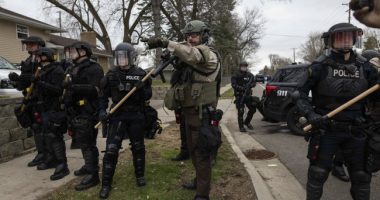Jury selection is slated to start Tuesday in the civil case that writer E. Jean Carroll brought against former President Donald Trump claiming that he raped her in the 1990s.
The former “Ask E. Jean” advice columnist filed suit against the 45th President in November, claiming he forced himself on her in a Bergdorf Goodman fitting room sometime in 1995 or 1996.
The lawsuit also accuses Trump, 76, of defaming Carroll, 79, when he publicly denied her allegations and claimed he didn’t know her.
The Manhattan federal court trial is expected to last between five and seven days.
Jurors selected to hear the case will remain anonymous throughout the proceedings, given the intense public scrutiny and possible harassment and threats they could face, the judge overseeing the case ruled last month.
Carroll – whose lawyers have said she will attend the whole trial – is listed as a potential plaintiff witness and is expected to testify.
Trump is listed as a defense witness, but his lawyers haven’t confirmed that he’ll take the stand — or even attend the trial.
Parties in civil cases are not required to be present at trial.
Last week, Trump attorney Joe Tacopina asked that the jury be informed that if the ex-president doesn’t show up to court, it would be due to the security “logistical burdens” his appearance would cause – a bid which Manhattan federal Judge Lewis Kaplan later denied.

Even if he chooses not to testify, jurors will likely be shown video clips of Trump’s deposition – which is included on a trial evidence list and which Carroll’s lawyers have said they have the right to play if Trump doesn’t take the witness stand.
Jurors may also hear from two of Carroll’s friends who she says she spoke to about the alleged attack, as well as from two other Trump sexual assault accusers, Jessica Leeds and Natasha Stoynoff, who are all on the witness list and could be called to testify by Carroll’s team, court records show.
Kaplan is also allowing Carroll’s side to play for jurors an excerpt of the infamous 2005 “Access Hollywood” tape in which Trump appeared to boast about sexually assaulting women.

Jurors could also be shown Trump’s Oct. 12, 2022 post on his media platform Truth Social in which he denied the rape accusation, claimed he didn’t know Carroll, said that she was not physically his type and seemed to imply she made up the alleged lie to increase book sales.
Carroll claims the Oct. 12 post hurt her emotionally and damaged her reputation and career.
The only listed potential witness for the defense – other than Trump – is a psychiatrist that will presumably be called to testify about the psychological damages that Carroll claims she suffered.
Ahead of the trial, Trump’s attorney had asked Kaplan to tell the jury: “The absence of the defendant in this matter, by design, avoids the logistical burdens that his presence, as the former president, would cause the courthouse and New York City.”
Read Related Also: Heather Rae El Moussa Makes Interesting Revelation Ahead Of ‘Selling Sunset’ Premiere
“Accordingly, his presence is excused unless and until he is called by either party to testify,” Tacopina wrote.
Kaplan responded that “there is nothing for the court to excuse” since parties are not required to be present at trial in civil cases.
“Mr. Trump is free to attend, to testify, or both,” the judge said. “He is free also to do none of those things.”
As to Trump’s arguments that coming to court would pose a security burden, the judge said Trump’s team had plenty of time to work out the logistics since the trial was scheduled in February.

When Trump appeared in Manhattan Supreme Court to be arraigned on a 34-count felony indictment earlier this month, law enforcement increased security measures around the whole city as well as near the courthouse and inside the building. He has pleaded not guilty in that case.
Manhattan civil lawyer Imran Ansari told The Post that if Trump doesn’t show up to the federal trial it could hurt how the jury perceives him.
“Not appearing for trial sends a horrible message to the jury,” Ansari said.

And if Trump doesn’t attend – or skips large portions of the trial – Carroll’s lawyers can argue “it shows his disregard to the plaintiff, the trial process and the jury who are there every day themselves,” Ansari explained.
In a separate 2019 suit, Carroll brought defamation claims against Trump for statements he made in June that year denying her attack accusations.
That case is pending in an appeals court on the issue of whether Trump could be sued since he was president when he made the comments.

In both lawsuits, Carroll alleged that sometime in 1995 or 1996 she bumped into Trump at the Fifth Avenue department store where they exchanged banter before Trump rushed her into the fitting room and assaulted her.
Once inside the fitting room, Trump allegedly pushed Carroll against the wall bumping her head and kissing her, the suit claims.
She tried to shove him off of her but he grabbed her arms pushing her against the wall and bumping her head again before raping her, the lawsuits alleged.
Carroll confided in two friends, one of whom told her to go to the police. But Carroll didn’t end up coming forward with her story until two decades later – prompted by the Harvey Weinstein sex assault scandal and the ensuing #MeToo movement.
An embattled Trump is also facing a separate $250 million fraud lawsuit by the New York Attorney General’s office and a criminal case related to his alleged hush-money payments to former porn star Stormy Daniels and to former Playboy model Karen McDougal about their claims they had affairs with Trump.
Carroll’s lawyer Roberta Kaplan declined to comment. Trump’s team didn’t return requests for comment.






